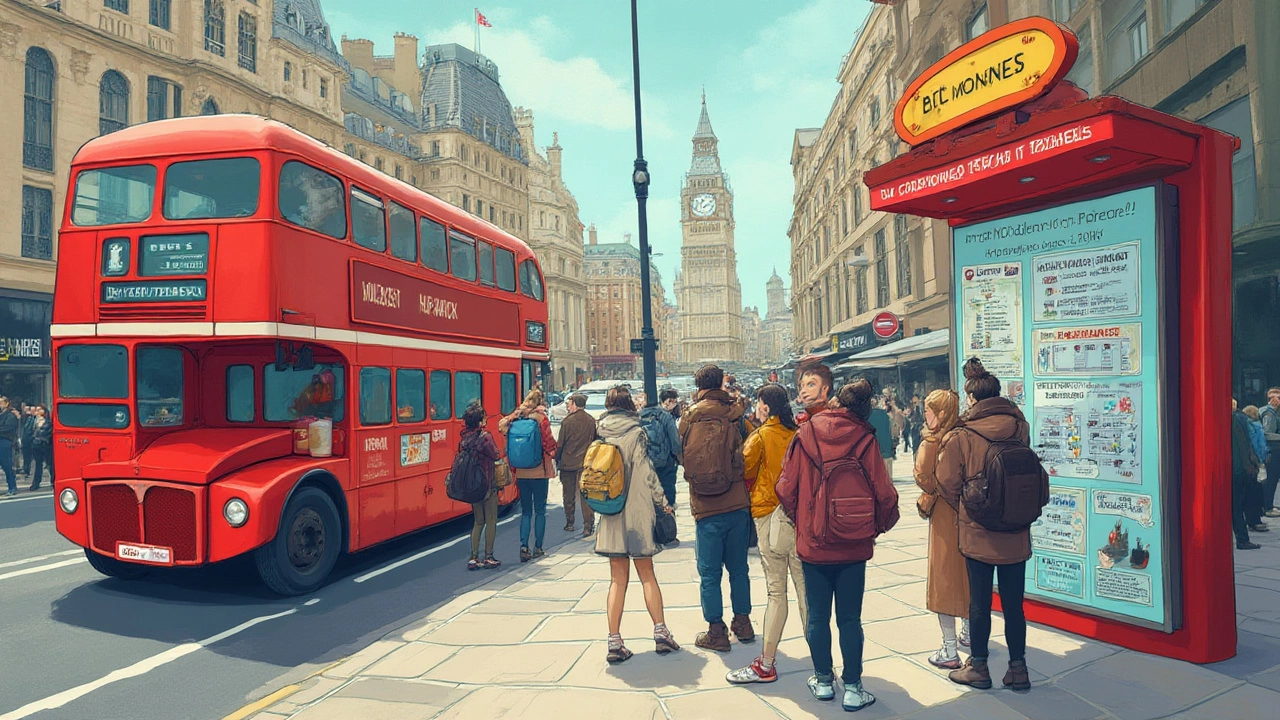 Jul, 9 2025
Jul, 9 2025
Imagine finding yourself in London, ready to photograph Big Ben, but all of a sudden you need a doctor—what happens next? Does holding a UK tourist visa mean local hospitals and clinics roll out the red carpet for you? The truth is, it’s more complicated than most travelers think. What’s covered on the NHS, what’s not, and how will a doctor in the UK actually treat someone just visiting for a few weeks? If you’ve wondered where you stand in the UK’s tangled web of health rules as a tourist, you’re in the right spot.
What Does Your UK Tourist Visa Really Cover When It Comes to Healthcare?
Let’s get straight into it: a UK tourist visa does not automatically give you free healthcare access like it does for UK residents. That lovely National Health Service (NHS), famous around the world for its free-at-the-point-of-use promise? It’s funded by UK taxpayers, for UK residents and certain long-term visa holders. Tourists are not in that club. If you’re in the UK on a Standard Visitor’s Visa, legally, you’re considered a private patient unless an emergency situation arises. NHS care isn’t just off-limits; it can be expensive if you need it unexpectedly.
The NHS will only treat tourists without charge for: immediate emergency treatment if your life is at risk, treatment required due to certain infectious public health risks, and the odd very specific category (like asylum-seekers or armed forces stationed abroad). For all other needs—think urgent but not life-threatening stuff like a broken bone, high fever, infections—you’ll be billed full whack. Even for accident and emergency visits, you only avoid charges for the initial stabilization; anything after that, from x-rays to surgery, costs. Unlike in New Zealand or Australia, no reciprocal healthcare agreement covers most tourists.
Let’s say you trip on Oxford Street, break your ankle, and get whisked to A&E. You aren’t shown the door, but once stabilized, the NHS can start charging you for any further care. They’ll take your details, maybe your passport, and you’ll likely get an invoice before you’ve even left the hospital bed. If you need ongoing care, a prescription, or follow-up, you’ll pay as a non-resident, and rates are often two or three times what residents are charged. So, unless you’re extremely lucky—or unluckily sick with one of those notifiable diseases—your UK tourist visa barely gets you past the reception desk when it comes to NHS care.
Emergency Services vs Routine Medical Treatment: Where Tourists Stand
Here’s where things get interesting. British law is clear: nobody should be refused immediately necessary medical care, regardless of their visa status or ability to pay upfront. If you’re in genuine danger—a heart attack, stroke, serious accident—the NHS will jump in to save your life. The drama in A&E is straight out of a prime-time series: you’ll be triaged, stabilized, and treated.
Yet, that’s only act one. Routine stuff—prescriptions for minor illnesses, specialist appointments, planned hospital stays—are not covered. You’ll pay private patient rates, and the bills can sting. Want to see a GP for a mild infection or a routine check-up? Not possible via the NHS; you’ll need to see a private GP and pay up front, often £70–£120 per visit. Prescriptions cost more, too. Pharmacy items are not free for tourists, and even an ordinary antibiotic can cost double the UK standard prescription charge.
The government actually has a list of services that are free to anyone: A&E only for the first stage, family planning services (excluding abortion), and treatment for certain contagious diseases. Babies born to tourists in NHS hospitals do get urgent care, but after discharge, all future care must be privately paid. Simply put: if it’s not saving your life, it’s not free. And hospitals do check. They’re required to ask about your immigration status for any non-emergency care and will chase up missing payments afterwards—even across borders. In 2022, NHS hospital debt from overseas visitors topped £331 million, and they’re getting stricter with up-front billing.
If you do need medicine, the rules get more tangled. You can buy over-the-counter items like paracetamol, cold medicines, and some antibiotics at UK pharmacies, but those are strictly for minor issues. Anything more technical will need a doctor’s prescription. NHS doctors can, in theory, write one for urgent cases, but only if there’s an immediate medical need. UK chemists are also required by law to see a valid, in-date, local prescription or a private prescription; foreign ones are not always recognized. Tourists dreaming of nipping in for quick NHS care will find a system designed to keep medical tourism in check.

Getting Private Healthcare: What Are Your Options as a Visitor?
You’re a visitor in the UK, but get sick enough to need a doctor— what now? If the NHS won’t help (or doesn’t cover your issue), you’re looking at private medicine. The UK has a strong private sector, especially in big cities like London, Manchester, and Edinburgh. Private GP clinics are easy to find, and many offer same-day appointments. Prices depend on the clinic and city, but a standard private GP visit is typically in the £80–£200 range. Some clinics offer “walk-in” appointments, but often with premium prices attached.
If you need tests or specialist care, costs go up fast. Blood tests, scans, and even a minor procedure can easily run a few hundred or a few thousand pounds. Private hospitals will require payment up front (often a deposit), and sometimes proof of insurance. Some clinics accept international travel insurance, but policies are checked very closely, and you may need to pay first and claim later. If there’s an overnight hospital stay involved, costs can spiral. For example, a night in a London private hospital, including meals and basic care, might start at £450 and rise quickly with treatments and medications.
Prescription medicines from a private doctor? Not covered by the NHS—they’re up to you. Even a simple inhaler can cost £40 or more. Dental care isn’t cheap either: private check-ups typically start at £60–£100, with fillings, extractions or emergency dental work adding hundreds more. Popular private clinics are used to overseas patients and usually have price lists online, but many expect payment in full before starting treatment.
If you’ve come prepared—say you have a good international travel insurance policy—double check what’s covered. Some budget policies only reimburse afterwards, so you’ll pay up front and then submit your claim from home. Others cap the daily payout for private hospitals, which may not cover all UK charges. It’s rare for any travel insurance to pay for elective or non-urgent pre-existing conditions. Always call your insurer before seeking treatment if you want to be sure the bill won’t be a massive shock.
Top Tips if You Need Medical Help as a Tourist in the UK
The golden rule applies: plan for the worst, hope for the best. Here’s how smart travelers save money and stress if they wind up needing UK medical attention:
- Sort good travel insurance before you even book your tickets. Check the fine print. Make sure it covers private healthcare costs in the UK and medical repatriation if you need to fly home while ill. Some policies exclude “adventure travel” activities or only cover pre-existing conditions if declared in advance.
- Carry copies of your insurance documents. If you need a doctor, clinics will want to see proof of coverage before treating you, especially in private hospitals.
- Keep handy translations of any key medical info—like allergies, chronic conditions, or prescriptions—especially if you don’t speak perfect English. It helps avoid confusion and speeds up treatment.
- Locate local GP clinics or ‘walk-in’ private centres before you need one—big cities have lots, but rural areas are thin on the ground and may have long waits or few options.
- Don’t expect pharmacists to fill overseas prescriptions. UK chemists operate under strict rules, so you may need a UK doctor to reissue your medication or suggest an equivalent.
- Program NHS 111 into your phone. This is the UK’s NHS hotline for urgent medical advice (non-emergency). They can direct you to the right local service, but advice is free and open to everyone—including tourists.
- If you’re hospitalised in an emergency, expect to provide ID and details for billing. Pay attention to forms and don’t ignore those invoices—they follow you across borders, and non-payment can block future UK visas.
- For dental or eye care emergencies, look for private clinics—most NHS dentists and opticians won’t accept new NHS registrations from tourists.
- Always carry enough cash or a payment card for any medical need. UK clinics rarely do “bill me later.”
Travelers sometimes get lucky and find charity clinics or expat networks willing to help, but those are rare exceptions. Relying on goodwill isn’t a backup plan.

Can You Plan for Treatment in the UK? Medical Tourism & Legal Risks
Maybe you’ve heard stories of people flying to London for surgery or specialist cancer care. Here’s the twist: the UK offers a specific “medical visitor” visa for planned private treatments, not the standard visitor visa. If you’re aiming for top surgeons or private clinics, you have to apply with proof of your treatment plan, show funds to pay your fees, and prove you’ll leave when it’s done. Medical visitor visas grant up to 11 months of stay for treatment, but you must stick to your pre-approved plan and pay all costs yourself.
Trying to sneak in elective surgery or planned specialist treatment on a tourist visa is against the law. Immigration officers are trained to spot vague reasons for visits if they involve suspicious amounts of luggage, medical equipment, or a treatment plan copied from a doctor’s letter. UK hospitals must report anyone they believe is trying “health tourism” on a tourist visa. If found out, you risk being refused treatment, reported to immigration, and even barred from entering the UK in the future. In 2024, border officials denied entry to over 1,300 travelers suspected of seeking medical treatment under false pretenses.
If you genuinely need urgent medical help while visiting—no problem, the system will still treat you humanely, but legally and financially you’re out of pocket. For planned surgery or specialist care, apply under the correct visa category, bring your paperwork, and be 100% transparent. Private clinics are used to handling both scenarios; they’ll give you written estimates, help navigate the required paperwork, and keep everything above board. Rushing the process or skipping these steps is not worth it.
Long story short, the UK’s system is generous in emergencies, but strict about who can use taxpayer-funded healthcare. Travel prepared, expect to pay for anything beyond stabilising emergencies, and if you’re planning anything major, get the right visa. The NHS is no free-for-all—but if you’re organized, there’s no need for horror stories about UK medical bills on your trip either.
